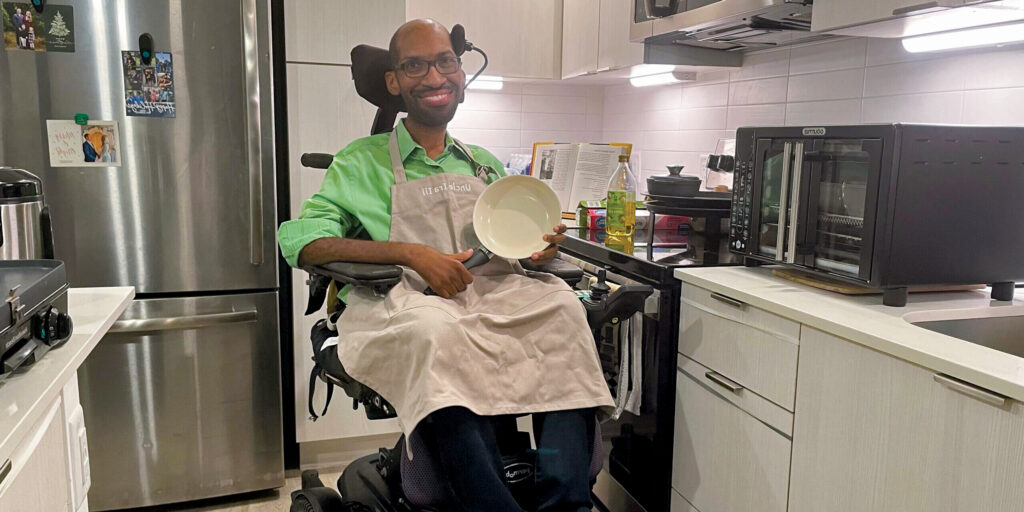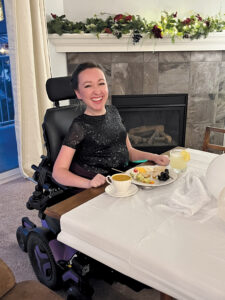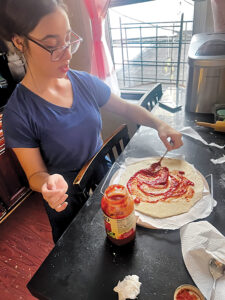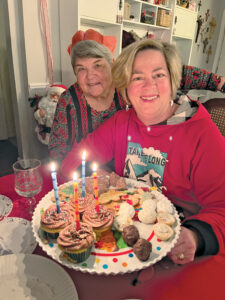
Stress-Free Holiday Entertaining
By Claire Sykes | Monday, November 18, 2024
From Hanukkah to Christmas to Kwanzaa, the holidays bring family and friends together with festivity, food, and fun. It also can be one of the most stressful times of the year for many people, especially when you’re hosting and you have a neuromuscular disease.
Fortunately, Quest Media has put together a guide to easy holiday entertaining with a disability. Follow these recommendations from community members and experts to minimize your holiday hosting stress — and remember why you’re having that party in the first place.
The right mindset

Amber Bosselman enjoys a holiday meal.
To get in the proper holiday party planning spirit, ask yourself a simple question: What kind of party would I enjoy?
“Do what’s best for you,” says Amber Bosselman, a Disability Life Coach in St. Paul Minnesota, who lives with spinal muscular atrophy (SMA). “I try to entertain in a way that’s natural and comfortable. When I feel confident, it’s fun for me and others, too.”
Here are more ways to maintain a joyful frame of mind while preparing a seasonal gathering:
- Keep it simple. “Don’t overdo or overthink things,” says Leah Zelaya, an MDA National Ambassador living with scapuloperoneal spinal muscular atrophy (SPSMA). “There’s no need to feel pressured or try to prove you can do something you can’t.” For example, it’s OK to keep the guest list small, order prepared food, or use paper plates.
- Pace yourself. Do the tasks on your to-do list a little at a time in the weeks before the party. Taking on too many tasks at once can lead to fatigue, a common symptom of neuromuscular diseases. Marisa Palandri, OT-L, CLT, CDRS, an occupational therapist at Oregon Health Science University, explains our energy is like a battery. “Before neuromuscular symptoms, you’re charged to 100%, but as your disease progresses, maybe you’re waking up every day at 50% to 70%. After one or two tasks, you drop to 25% to 50%. At that point, take a break so you can recharge and avoid hitting 10%.”
- Enlist help. “Often, people feel bad asking for help. However, what is worse is not asking for help when you need it,” says Leah. When you allow others to step in, you lighten your load, and you give them a chance to contribute to the fun occasion.
- Know your guests. Before you decide on food and beverages, ask guests about any dietary restrictions. Consider who might want to meet or sit near each other and enjoy certain games. “Have something for everybody and plenty of everything,” says Ira Walker, an MDA National Ambassador living with SMA.
- Go with the flow. Keep in mind that nothing is going to be perfect. “Don’t sweat the small stuff you think people might be bothered by; they won’t be,” says Ira. Amber says, “You may think the spotlight is on you, so you might feel scared to make mistakes. The truth is, everyone attending feels like the spotlight’s on them.”
Plan and prepare
Here are the main elements to get ready for your party.

Leah chooses simple, crowd-pleasing recipes.
Your budget
Decide on a budget, then determine what type of party you can have within that. “Don’t add unnecessary stress by overspending,” Ira says. “Most of your expenses will go to food and beverages. The last should be decorations.”
Your home
In the weeks before your holiday party, clean your home (or hire someone to do it), designate a place for guests’ coats, set up tables or arrange small group sitting areas, get out serving dishes, and make room for the food and beverages.
The kitchen
If you like to cook or bake but muscle weakness slows you down, consider investing in some new kitchen equipment. Ira recommends lightweight pans and countertop appliances, such as a small grill, crockpot, and a toaster oven/air fryer combo. Leah’s family has purchased adaptive kitchen equipment, such as a rocker knife, nonslip cutting boards, and vegetable choppers, from wellness4ky.org/resource/adaptive-kitchen-equipment.
The menu
Love homemade? “Stick to what you know and do well,” says Therese. “Now is not the time to try a new recipe unless you give it a trial run first.” You can ease the burden on yourself by making one or two dishes you enjoy and rounding out the meal by asking guests to bring other dishes or ordering food.
The food and drink

Therese asks guests to bring desserts and charitable donations to her holiday party.
Think about what you can prepare ahead of time. “You can cook and bake things a day or even weeks before and freeze them,” recommends Leah’s mom, Bevi. Then, you’ll just need to thaw or heat them on the day of the party.
The table
Will your dinner be sit-down or self-serve? Either can be formal or casual, but one is a lot easier, at least for Leah and Bevi, who prefer buffet style. For a potluck, have empty platters, bowls, and serving utensils waiting for guests who bring dishes.
You!
Yes, you are an essential element of the party, so don’t neglect your own care. Get plenty of sleep, especially the night before. Marisa, an occupational therapist, suggests using the evening before the party to shower and fix your lunch for the next day. On the day of the party, do as little as possible so you can save your energy for your guests. If you live alone and think your home will feel too empty and quiet once everyone leaves, ward off loneliness by asking a friend to call you afterward.
Have a great time
When it’s time to mix and mingle, follow these tips to make sure your guests — and you — enjoy the occasion.
- Be welcoming. “Warmly greet each guest and let them know how happy you are that they’re there,” says frequent hostess Therese. Designate someone to help you take their coats and offer drinks as they arrive.
- Get comfy. “As host, you want to create an environment for people to enjoy themselves,” says Amber. This might involve helping quieter people mingle and bringing those who don’t know the other guests into the fold. “When you introduce guests to each other, say lovely things about them,” suggests Therese. This makes each person feel special and can spark conversations.
- Take breaks. It’s OK to leave the party for a few minutes. Privately ask someone to play substitute host during those moments. “No one needs to know you’re gone except the person privy to your ‘code phrase,’ so they can take over the host job for a little bit,” says Marisa.
- Stay put. Don’t be flitting around cleaning up as the party is happening. Conserve your energy so you can give your full attention to your guests.
- Have fun. Why entertain unless you do? “It’s not your home or the food that matters most. But rather, if you’re relaxed and enjoying yourself, then your guests are, too,” says Therese.
Give gratefully
In hosting a holiday gathering, you do more than open your home to others. “You give them a peek into your life and share how you’ve adapted to some of the challenges you face every day,” Therese says. This may seem like a small thing, but it matters in ensuring that people with disabilities are visible and represented in our society.
Entertaining can also have benefits for the host: “You create more opportunities to continue building deep connections, which is also a great antidote if you’re prone to feeling lonely,” Amber notes.
When you make entertaining easier on yourself, the stress you alleviate opens up your heart to spend quality time with those you love more generously. There’s no better gift than that. Q
Claire Sykes is a freelance writer in Portland, Oregon, who covers health and the human side of bioscience.
Party Profile: The Zelaya Family
“The meaning of the holidays is to gather with loved ones and appreciate each other,” says Bevi. Her husband, Jaime, and their 16-year-old daughter, Leah, both live with scapuloperoneal spinal muscular atrophy (SPSMA), and it doesn’t stop this family of five in Brooklyn, New York, from hosting annual holiday gatherings for friends and family. Even preparing for their guests is a party for Bevi and her three children. “We’re building memories,” Bevi says.
Party Profile: Ira Walker
Growing up, Ira enjoyed the parties his parents had in their suburban St. Louis home. “My sister, Romanda, also was born with spinal muscular atrophy, and we were both in wheelchairs. Knowing that not everybody’s house was accessible, my parents wanted to make sure we were included, so they always raised their hands to host,” he says. When Ira moved into an apartment, he started having parties of his own.
“I learned from watching my parents how to throw a great get-together, and I’ve hosted lots of them, of various sizes,” he says. “The most important thing is to be together and celebrate with one another.”
Party Profile: Therese Gabriel
“I love making people happy. And they are when you feed them good food and provide a welcoming home,” Therese says. She’s been spreading happiness for more than 40 years. Up to 18 friends and family come to her home in St. Louis for Thanksgiving dinner. For Christmas, she hosts a dinner/cookie party where, instead of gifts, guests bring cookies and items to donate to a local charity. Therese assures that no one is left out: “If plans have changed for any neighbors, friends, or family, and they have no place to go, all are invited to join us!”
Cheerful or challenging?
How do Quest readers feel about the holidays? See the latest Quest Poll on page 48. If you’re feeling holiday stress, listen to the Quest Podcast at MDAQuest.org/podcast/holiday-stress.
You Are Not Alone
Everyone feels lonely sometimes. That feeling can be especially difficult during the holiday season. Learn how you can take healthy steps to lessen or avoid loneliness in a Quest Magazine online exclusive article at MDAQuest.org/not-alone.
Next Steps and Useful Resources
- If you’re feeling holiday stress, listen to the Quest Podcast at MDAQuest.org/podcast/holiday-stress.
- That feeling can be especially difficult during the holiday season. Learn how you can take healthy steps to lessen or avoid loneliness in a Quest Magazine online exclusive article at MDAQuest.org/not-alone.
- If you like to cook or bake but muscle weakness slows you down, consider investing in some new kitchen equipment from wellness4ky.org/resource/adaptive-kitchen-equipment
- Learn tips and tricks for Thanksgiving and beyond from Gabby DiSalvo, a chef with a disability who adapts her cooking using mobility equipment, accessible tools, and shortcuts.
- Stay up to date on Quest content! Subscribe to Quest Magazine and Newsletter.
Disclaimer: No content on this site should ever be used as a substitute for direct medical advice from your doctor or other qualified clinician.




